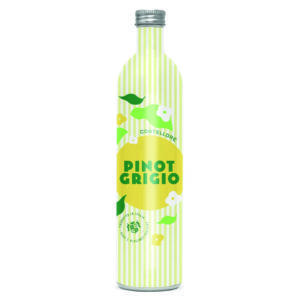ALDI Launches Supermarket First Own-Label Aluminium Wine Bottle for Just £5.99
Aldi is toasting to a greener future with the launch of the UK’s first supermarket own-brand aluminium wine bottle. Arriving in stores on 14th April, the Costellore Pinot Grigio (£5.99, 75cl) delivers exceptional value and impressive sustainability credentials.

The innovative aluminium bottle weighs just 95g, almost 75% lighter than a standard glass bottle, and is fully recyclable. This significant weight reduction translates to a considerable transport saving of over 5 tonnes (the equivalent of a small elephant) per truckload.
The wine itself, a crisp and refreshing Pinot Grigio with notes of zesty lemon and orchard fruits, is shipped directly from Italy and bottled at a sustainably powered UK winery. It’s the perfect accompaniment to seafood, white meats, light creamy sauces, or pasta.
This launch comes hot on the heels of Aldi being crowned ‘Sustainable Drinks Retailer of the Year’ at The Drinks Retailing Awards[1], highlighting the supermarket’s commitment to sustainable practices. This award acknowledges Aldi’s ongoing efforts, including the introduction of a super-lightweight bottle in partnership with Lanchester Wines, and two own-brand wines in paper bottles.
Julie Ashfield, Chief Commercial Officer at Aldi UK, says: “Our buying teams are constantly exploring ways to offer greater value and greener choices for our customers. Shoppers are looking for ways to make a difference, and we’re proud to be leading the way with innovations like this aluminium wine bottle, building on our commitment to sustainable packaging.”
Aldi partnered with Broadland Drinks, a UK-based company dedicated to providing climate-friendly packaging for the drinks industry, on this supermarket-first initiative.
Catherine Smith, Commercial Director at Broadland Drinks, added: “We’re delighted to partner with Aldi on the launch of the aluminium wine bottle. This initiative fits perfectly with our ambition to reduce our own carbon footprint and work with our retailers to make their businesses more sustainable. We know the biggest factor in a bottle of wine’s carbon footprint is the bottle itself, so by switching from glass to aluminium, we can help meet the rising demand for alternative lower carbon formats.”
Related news
Tesco sets out store expansion plans in 2026 including five former Amazon Fresh sites
🎧 Hallgasd a cikket: Lejátszás Szünet Folytatás Leállítás Nyelv: Auto…
Read more >Brits Embrace At‑Home Celebrations While Germans Cut Back on Valentine’s Day Spending
🎧 Hallgasd a cikket: Lejátszás Szünet Folytatás Leállítás Nyelv: Auto…
Read more >Veganuary inspires millions of people in the UK
🎧 Hallgasd a cikket: Lejátszás Szünet Folytatás Leállítás Nyelv: Auto…
Read more >Related news
II. Green Gastronomy – Marketing Communication Workshop organized by the MMSZ HoReCa and Green Section
🎧 Hallgasd a cikket: Lejátszás Szünet Folytatás Leállítás Nyelv: Auto…
Read more >Nearly 140 domestic suppliers, 60% growth – SPAR Regions Treasures program accelerates with AI solutions
🎧 Hallgasd a cikket: Lejátszás Szünet Folytatás Leállítás Nyelv: Auto…
Read more >








